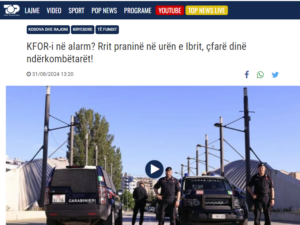The deployment of additional KFOR troops on the Ibar Bridge was a training exercise, not an alert, as some media outlets in Kosovo and Albania have incorrectly reported. Considering the significant public interest in developments around the main bridge in Mitrovica, which the government has notified will open despite strong international opposition, various media have published unverified information.
On August 31, 2024, Top-Channel published an article titled: “KFOR on alert? Increases presence at the Ibar Bridge, what do the internationals know?”.
The article claims that after Kosovo authorities closed five parallel Serbian municipalities in the north of the country, NATO's peacekeeping mission, KFOR, increased its presence on the main bridge over the Ibar River. However, no additional information is provided to support the claim that KFOR might be on alert, as suggested in the headline. The text also does not explain what the internationals know, despite the headline's implication.
The same article was shared by Thuaje.com, Konica.al, Portali Fiks, Gazeta Tema.

Photo Source: Top Channel
Following the publication of these reports, the KFOR mission responded, clarifying the purpose behind the increased troop presence on the bridge.
According to KFOR, the additional units, belonging to their Multinational Specialized Unit, were temporarily stationed on the main bridge over the Ibar River in Mitrovica.
“These additional deployments are part of KFOR's regular training exercises to test our procedures and maintain the highest operational standards,” KFORstated. They also added that the Kosovo Police had been informed about this training in advance.
Since the end of the war, KFOR has been present on the Ibar Bridge, which is currently open only to pedestrians, even though the work to revitalize it for vehicle traffic was completed years ago. While KFOR has reaffirmed its presence on the bridge, the EU and QUINT have urged the government not to open the bridge to vehicles at this time. KFOR has echoed this call, emphasizing that these issues should be addressed through the Brussels Dialogue.
“We believe that only KFOR's actions can guarantee peace and security in the Serbian areas in northern Kosovo, as well as provide space for a political dialogue mediated by the European Union, which would resolve all open issues in the normalization process of relations.”
One day before the deployment of KFOR troops on the Ibar Bridge, Kosovo authorities closed five parallel Serbian facilities in northern Kosovo, which authorities claimed that they have been operating under directives from Serbia. However, this action was widely condemned by the international community, being described as an unilateral move by the government.
The EU expressed its “disappointment” with Kosovo's continued lack of coordination with international and security partners. NATO also voiced its disappointment through spokesperson Farah Dakhlallah, who stated that the actions were not coordinated, “despite repeated promises that such coordination would occur.”
In tense situations, such as the increase in KFOR's presence on the Ibar Bridge, it is crucial for the media to verify information before publishing it. Misinformation can cause unnecessary panic, escalate tensions, and affect the public's perception of the situation.
*This article is published as part of the Western Balkans Regional Initiative against disinformation. “Western Balkans Anti-Disinformation Hub: exposing malign influences through watchdog journalism.”





























































